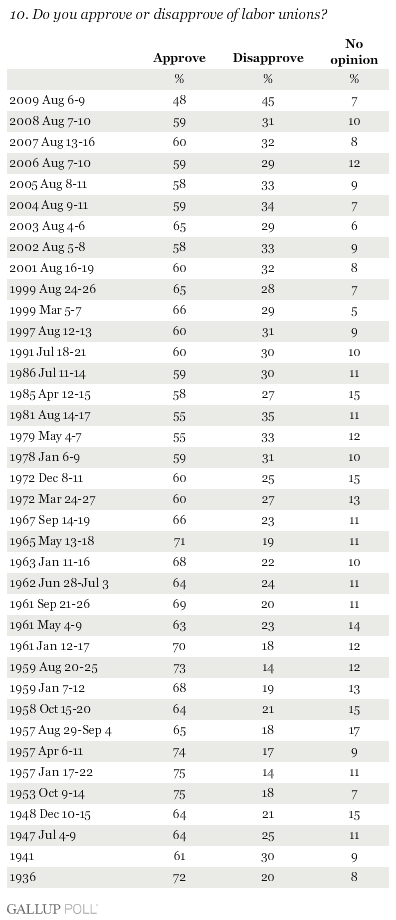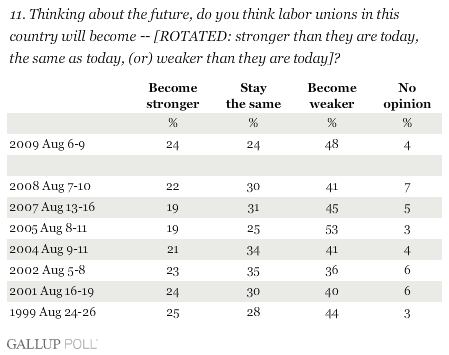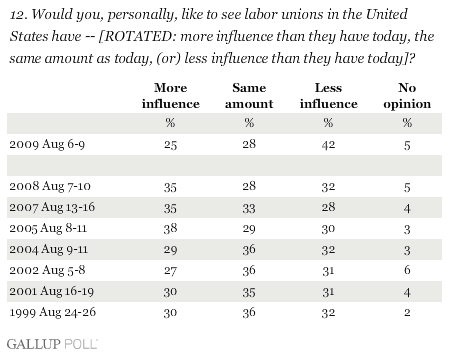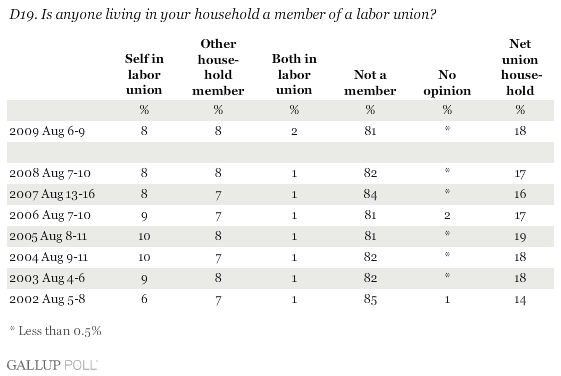PRINCETON, NJ -- Gallup finds organized labor taking a significant image hit in the past year. While 66% of Americans continue to believe unions are beneficial to their own members, a slight majority now say unions hurt the nation's economy. More broadly, fewer than half of Americans -- 48%, an all-time low -- approve of labor unions, down from 59% a year ago.
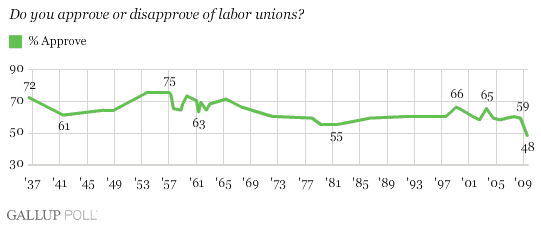
These results are from the 2009 installment of Gallup's annual Work and Education survey, conducted Aug. 6-9. The 48% of Americans now approving of unions represents the first sub-50% approval since Gallup first asked the question in the 1930s. The previous low was 55%, found in both 1979 and 1981.
Public reaction to labor unions is one of the longest-running trends The Gallup Poll has maintained. Gallup first asked "Do you approve or disapprove of labor unions?" in 1936, a year after Congress passed the National Labor Relations Act establishing the right of most private-sector employees to join unions, to bargain collectively with their employers, and to strike. That first poll found 72% of Americans approving of unions and only 20% disapproving.
While approval of unions has declined since 2008 among most major demographic and political groups, the biggest drop has been among political independents.
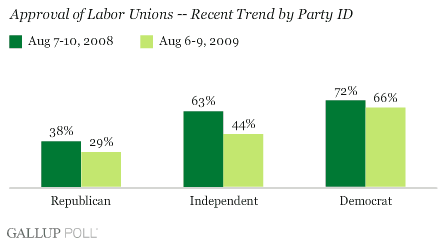
Unions Help Own Workers, Hurt Other Workers and the Economy
Organized labor was put in the spotlight last December as Congress considered a major bailout package for the ailing U.S. auto industry. Gallup polling at that time found a substantial segment of Americans blaming the auto unions for the industry's problems, although more blamed auto executives.
Perhaps accordingly, Gallup records significant increases in the August 2009 Work and Education survey compared with August 2006 in sentiment that unions have a negative effect on companies where workers are organized, and on the economy generally.
The percentage saying unions mostly hurt the companies where workers are organized has risen from 39% in 2006 to 46% in the latest poll. As a result, Americans are now evenly divided over whether unions mostly help or mostly hurt these companies, whereas in all previous measures the balance of opinion was positive.
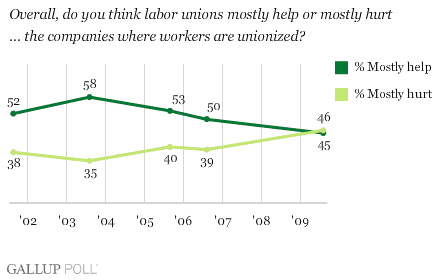
There has been an even larger jump in the percentage saying labor unions mostly hurt the U.S. economy, from 36% in 2006 to 51% today. This is the first time since the question was established in 1997 that more Americans have said unions hurt rather than help the economy. Americans' general concerns about the current state of the economy could certainly be a factor in these more negative views of unions, in addition to specific perceptions about unions.
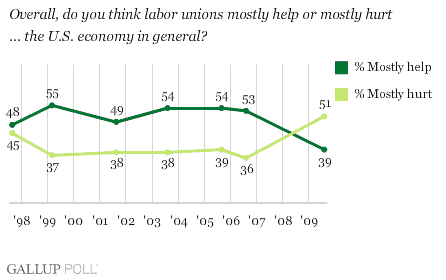
Most Americans continue to believe unions are beneficial to their members: 66% in the 2009 poll say unions mostly help workers who are members of unions, while only 28% say unions mostly hurt them. However, this is a slightly less positive assessment than Gallup found in the previous measure in 2006, and is the lowest reading since the question was first asked in 1999.
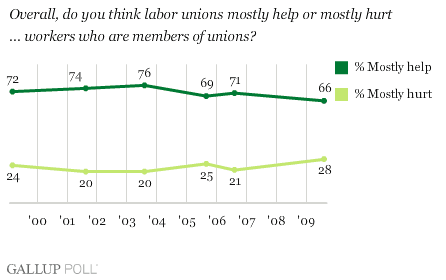
Americans' most negative assessments of unions -- as has typically been the case -- involve their impact on non-union workers. More than 6 in 10 Americans, up from about half in 2006, say unions mostly hurt non-union workers.
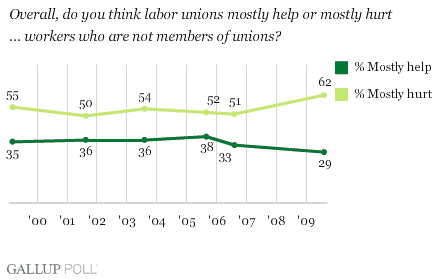
Americans living in union households and those in non-union households have sharply different assessments of unions' impact on each of the four dimensions mentioned above. However, the widest gap is in perceptions of unions' impact on the companies where workers are unionized. Of adults living in union households (representing 18% of all U.S. adults), 7 in 10 believe unions help the companies; only 39% of residents living in non-union households agree.
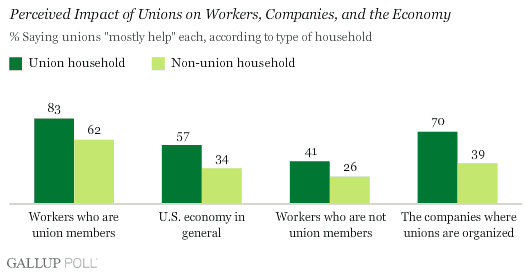
Unions on the Rise or Declining?
If unions are perceived as beneficial to their members and as hurting nonmembers, does this mean Americans would like unions' reach to be expanded or cut back?
The answer in this year's survey is relatively negative: 42% say they want unions to have less influence in the United States, compared with 25% favoring more influence. In August 2008, these figures were about even. However, factoring in the 28% of Americans who want unions to maintain their current influence results in a combined 53% backing the current power of unions -- still the largest opinion segment.
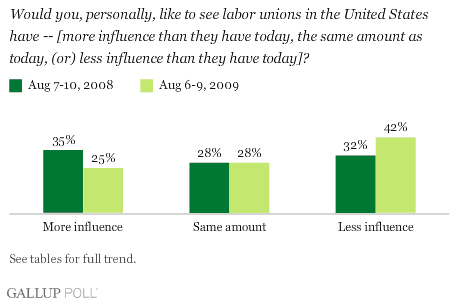
Americans' perceptions of unions' prospects for the future are slightly more negative. With the United States' manufacturing base in conspicuous decline and the auto industry's troubles headline news, 48% of Americans, up from 41% a year ago, predict that labor unions in the country will become weaker.
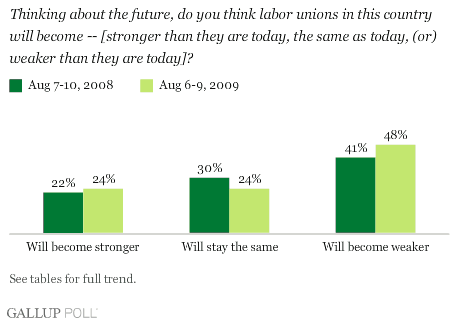
Bottom Line
This year's Gallup update on views toward unions comes in the midst of an economic recession, and in the aftermath of major economic interventions by the U.S. government on behalf of two of the Big Three domestic auto companies.
The update also comes as the Employee Free Choice Act -- a proposal to significantly change collective bargaining laws -- is still under consideration by Congress. If passed as originally proposed, the bill would most likely make it easier for unions to organize. In fact, proponents of EFCA (who feel the current system is stacked against unions) say that's the intent. However, those changes may be going against the tide of public opinion, which currently is at a historically low ebb for unions.
Survey Methods
Results are based on telephone interviews with 1,010 national adults, aged 18 and older, conducted Aug. 6-9, 2009. For results based on the total sample of national adults, one can say with 95% confidence that the maximum margin of sampling error is ±4 percentage points.
Interviews are conducted with respondents on land-line telephones (for respondents with a land-line telephone) and cellular phones (for respondents who are cell-phone only).
In addition to sampling error, question wording and practical difficulties in conducting surveys can introduce error or bias into the findings of public opinion polls.
